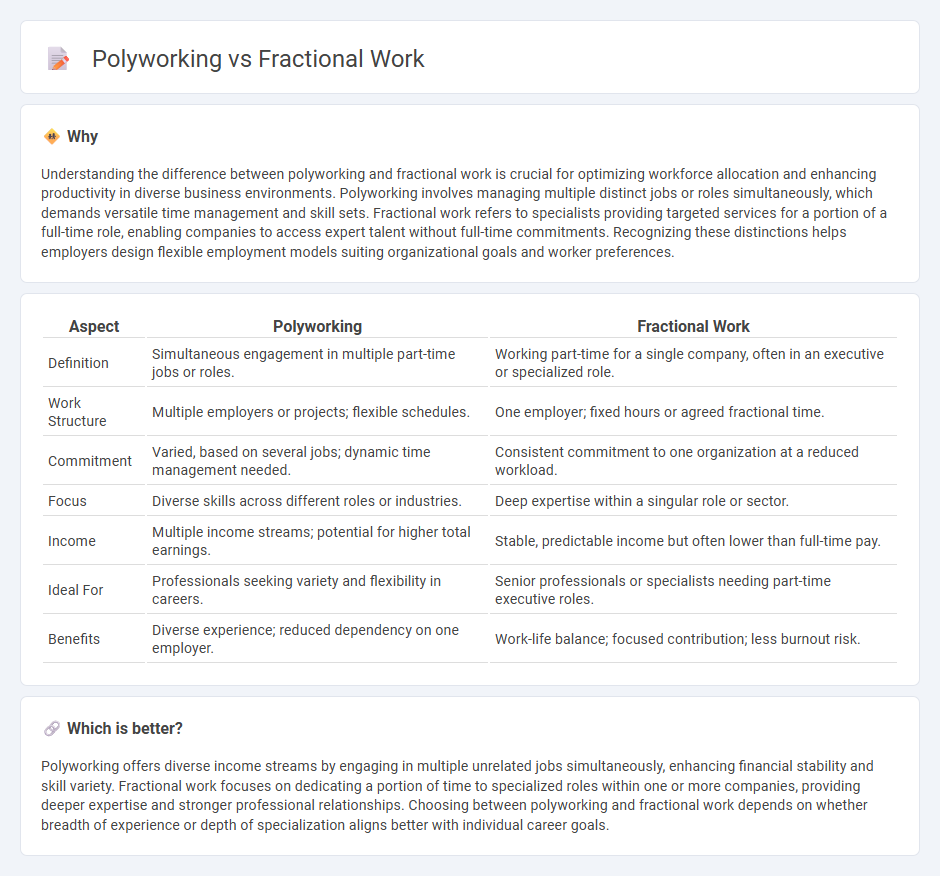
Polyworking involves managing multiple part-time jobs across different fields simultaneously, offering diverse income streams and skill development. Fractional work focuses on dedicating a set percentage of time to high-level roles within a single organization, enhancing specialized expertise and leadership impact. Explore the distinctions between polyworking and fractional work to optimize your career approach.
Why it is important
Understanding the difference between polyworking and fractional work is crucial for optimizing workforce allocation and enhancing productivity in diverse business environments. Polyworking involves managing multiple distinct jobs or roles simultaneously, which demands versatile time management and skill sets. Fractional work refers to specialists providing targeted services for a portion of a full-time role, enabling companies to access expert talent without full-time commitments. Recognizing these distinctions helps employers design flexible employment models suiting organizational goals and worker preferences.
Comparison Table
| Aspect | Polyworking | Fractional Work |
|---|---|---|
| Definition | Simultaneous engagement in multiple part-time jobs or roles. | Working part-time for a single company, often in an executive or specialized role. |
| Work Structure | Multiple employers or projects; flexible schedules. | One employer; fixed hours or agreed fractional time. |
| Commitment | Varied, based on several jobs; dynamic time management needed. | Consistent commitment to one organization at a reduced workload. |
| Focus | Diverse skills across different roles or industries. | Deep expertise within a singular role or sector. |
| Income | Multiple income streams; potential for higher total earnings. | Stable, predictable income but often lower than full-time pay. |
| Ideal For | Professionals seeking variety and flexibility in careers. | Senior professionals or specialists needing part-time executive roles. |
| Benefits | Diverse experience; reduced dependency on one employer. | Work-life balance; focused contribution; less burnout risk. |
Which is better?
Polyworking offers diverse income streams by engaging in multiple unrelated jobs simultaneously, enhancing financial stability and skill variety. Fractional work focuses on dedicating a portion of time to specialized roles within one or more companies, providing deeper expertise and stronger professional relationships. Choosing between polyworking and fractional work depends on whether breadth of experience or depth of specialization aligns better with individual career goals.
Connection
Polyworking and fractional work are interconnected as both involve dividing an individual's professional time across multiple roles or employers, maximizing skill utilization and income streams. Fractional work typically refers to part-time engagements focusing on specialized expertise, while polyworking encompasses a broader approach of balancing several jobs or projects simultaneously. This synergy supports workforce flexibility and meets the growing demand for diversified employment arrangements in the modern gig economy.
Key Terms
Gig Economy
Fractional work involves professionals dividing their time between multiple employers, often in specialized roles, while polyworking refers to juggling various distinct job types or gigs simultaneously within the Gig Economy. The Gig Economy thrives on flexibility, enabling workers to leverage both fractional and polyworking models for diversified income streams and skill development. Explore how these approaches transform modern labor markets and personal career strategies.
Multiple Job Holding
Fractional work involves dividing time among specialized roles within one or several companies, allowing professionals to leverage niche expertise, whereas polyworking emphasizes holding multiple distinct jobs or projects simultaneously for diversified income and experience. Multiple job holding supports economic resilience and skill expansion, with polyworkers often managing unrelated roles across industries, while fractional workers concentrate on strategic contributions within their fields. Explore detailed comparisons to understand how each approach impacts career growth and work-life balance.
Flexible Scheduling
Fractional work enables professionals to commit to multiple part-time roles within different companies, creating tailored schedules that enhance work-life balance. Polyworking involves juggling diverse job types simultaneously, often across industries, requiring advanced time management and adaptability to flexible scheduling demands. Explore more insights on optimizing flexible scheduling strategies to thrive in fractional work and polyworking environments.
Source and External Links
Fractional work - Wikipedia - Fractional work is a flexible work model where individuals provide specialized skills or management services to multiple organizations on a part-time or project basis, distinct from traditional part-time or contractor roles.
What is Fractional Work? - Fractional work typically involves part-time expert work paid on a monthly retainer, allowing companies to access needed skill sets for fewer hours than a traditional full-time role, thus optimizing costs and efficiency.
Fractional Jobs | The Job Board For Fractional Work - Fractional Jobs is a platform that connects fractional professionals with companies seeking part-time expert talent across various functions, providing resources and support for success in fractional work arrangements.
 dowidth.com
dowidth.com